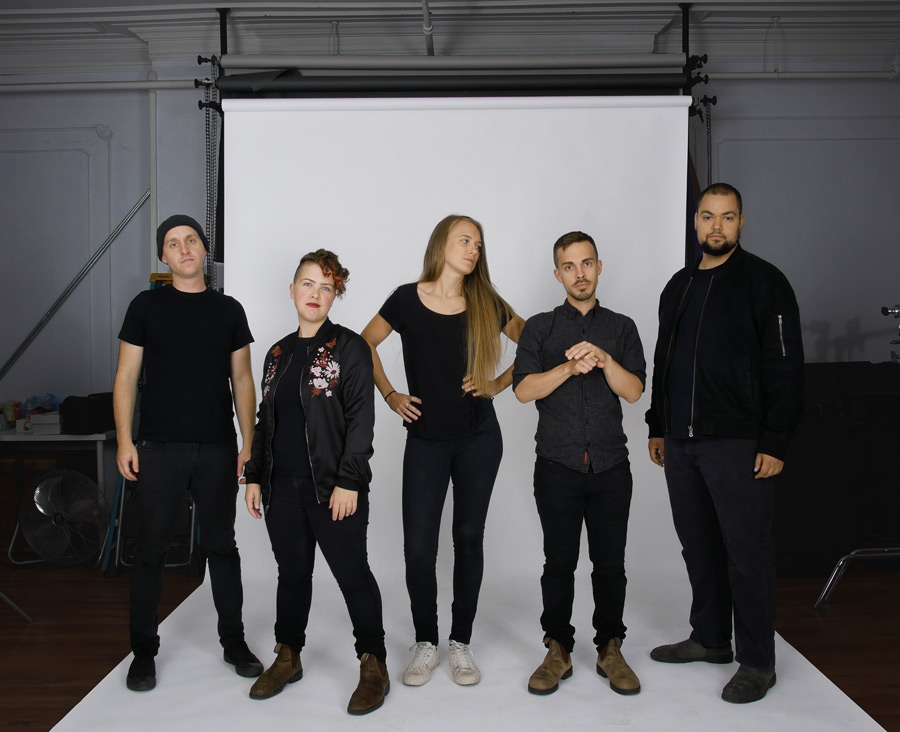Nova Scotia’s indie-folk darlings turn up the volume on their new record, The Wilder Beyond. The sound is vast but intimate, alternating three-part harmonies that confess doubts and desires across canyons of reverb, Phil Collins-sized drums, elastic keys, and swaths of guitars that bleed like watercolours into tightly-orchestrated strings.
Recorded in chief-songwriter Paul Aartenen’s Halifax apartment, Aartenan and vocalist/guitarist Clayton Burrill discuss coaxing the record’s cinematic sound out of their confined workspace:
[question]What was the motive behind foregoing a formal studio setting in recording The Wilder Beyond? Did the setting influence the stylistic shift from the folk roots of the group’s last record?[/question]
[answer][Paul] Our sound evolved quite a bit over the past year, prior to making the record. After Clare joined, the volume of the drums opened the door for us to sound how I’d always wanted us to—bigger, with less of an emphasis on folk. Clayton and I have been playing electric guitars live for a while, so it was a natural extension for the sessions. Recording the album ourselves, in my apartment, was a decision born out of financial necessity.[/answer]
[question]It sounds as if the DIY approach warranted further scrutiny of the Hillsburn’s sound. The songs are muscular, but there’s a fantastic clarity and massive stereo-width characterized by thoughtful, spacious arrangements. The album is layered, but it isn’t cluttered. [/question]
[answer][Paul] That’s exactly right. We weren’t happy with the sound of our first record. The whole process was rushed and the final product was less than ideal, to our ears. Recording outside of a traditional by-the-day or by-the-hour studio environment allowed us the time to experiment with different instruments and production ideas, to slow down and take our time. We did at least half a dozen mixes of every song, and twice that many of some. We weren’t going to stop until wholly satisfied. [/answer]
[question]The record has an orchestral quality—almost baroque. Is this something the band consciously draws from?[/question]
[answer][Paul] I’d say it’s partly conscious as well as the sum of our backgrounds. Jackson, Rosanna, and Clare all studied music in university, so they have a wealth of varied influences to draw on. Rosanna is classically trained on the violin; Clare subs with Symphony Nova Scotia; and Jackson is a trained composer who has written in classical, jazz, and other genres. [/answer]
[question]Were there any notable or crucial influences to the shape of the new material, musical or otherwise?[/question]
[answer][Paul] Because I was learning to engineer and mix as we went, it was crucial to go back regularly and reference some traditionally good-sounding records, to make sure our ears were leading us in the direction of something at least somewhat professional. Every now and then we’d stop and put on Ceremonials by Florence + The Machine, or High Violet by The National, for example, to make sure we were in the ballpark.[/answer]
[question]The record’s paradoxical themes of pain and joy, death and rebirth, suggest the kind of personal, internal struggle characteristic of today’s most confessional indie-rock, but there’s a universality to many of its most memorable lines that transcend the personal. How does one know when they’ve penned a lyric that walks this fine line? How important is relatability in regards to sheer self-expression?[/question]
[answer][Paul] I can’t say how one knows when that fine line has been walked successfully, but that’s always what I’m shooting for. The writers I most admire are experts at this. They can have very specific stories, with details or events that are completely foreign to me, but they arrange the delivery of the information in such a way as to capture a feeling that’s universally resonant, whether it’s loss, joy, love, etc. Joni Mitchell is, in my opinion, one of the best at this. [/answer]
[question]The large, often epic nature of the new songs sound like they should pack a real punch live. Has prepping the tunes for the stage been rewarding? Were there or are there any foreseeable obstacles in bringing the new material on tour?[/question]
[answer][Clayton] It was definitely fun to tackle the live arrangements for these songs. It took a lot of thought in some cases. Jackson added a new, more versatile synth to his setup after we finished making the record and Rosanna’s started playing a synth as well, so we’re able to do some things live that we wouldn’t have been able to six months ago. In most cases, if we weren’t able to replicate a part from the record in a live arrangement, the song still sounded compelling. We’re also all content with the live show being its own entity. Some of the live versions of songs are actually more epic sounding than what’s on record![/answer]
[question]What’s the best part of hitting the road?[/question]
[answer][Clayton] The shows themselves![/answer]
[question]What’s next for Hillsburn?[/question]
[answer][Clayton] Lots of touring over the next couple months across Canada and the UK, festivals in the summer, and I guess at some point we’ll have to start thinking about the next record! Making an album is such a long process.[/answer]
Hillsburn features Paul Aarntzen (vox/guitar), Rosanna Burrill (vox/violin), Clayton Burrill (vox/guitar), Jackson Fairfax-Perry (piano/keys) and Clare Macdonald (percussion).
Keep up with the latest tour dates and more from Hillsburn on their site, via Twitter, Facebook and Instagram, and check out their single “Young Desire” about the first love of two LGBTQ kids.
Fun fact: The lead role is played by Debbie Perrott, who is also the mother of Hillsburn‘s Rosanna and Clayton Burrill!

